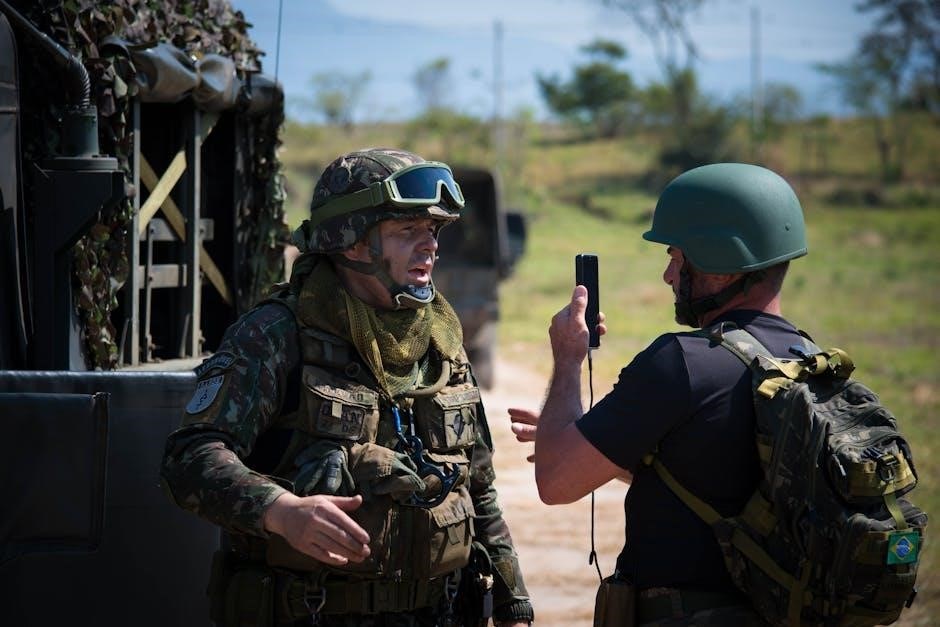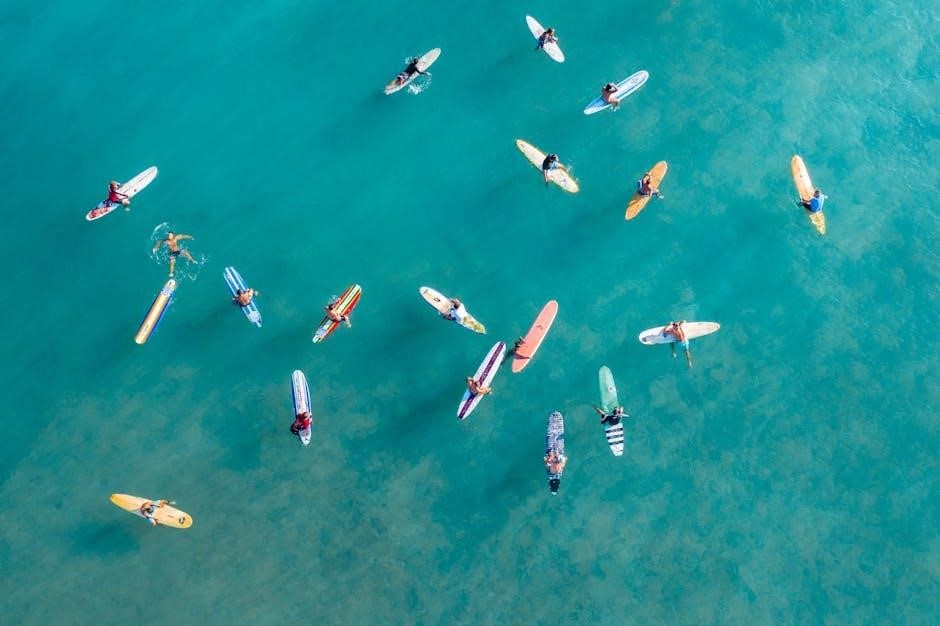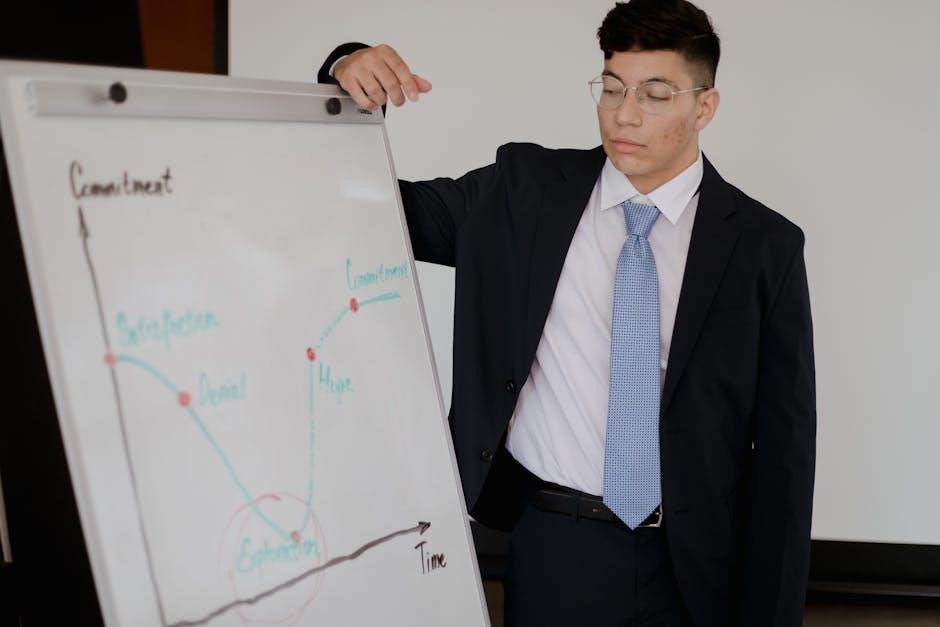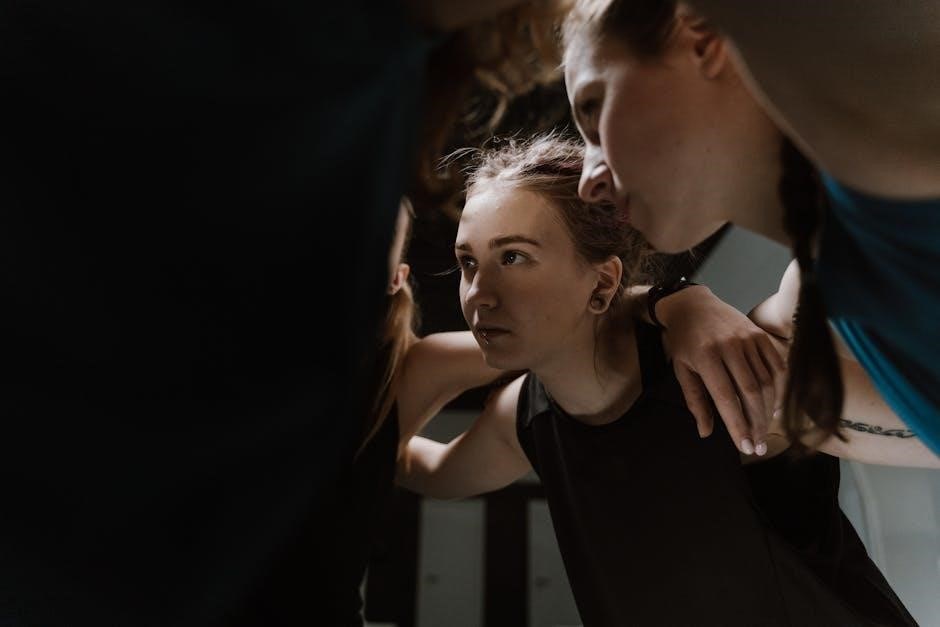The Royal Marines Training Plan is a comprehensive, 4-week conditioning program designed to prepare recruits for the rigorous demands of commando training, ensuring peak physical and mental readiness.
Overview of the Training Structure
The Royal Marines Training Plan is structured into two main phases: the Recruit Orientation Phase (ROP) and Commando Training. The 4-week ROP focuses on building foundational fitness and adaptability, followed by a progressive Commando Training phase. Recruits undergo rigorous physical conditioning, including running, swimming, and load-carry exercises, with assessments like the Commando Aptitude Assessment (CAA). The plan emphasizes mental resilience, teamwork, and leadership, preparing recruits for the challenges of Royal Marines life. A pre-entry fitness plan and a 6-week training program guide aspirants to meet entry standards. The structured progression ensures recruits are tested and developed to meet the elite standards required for Royal Marines.
Importance of the Training Plan for Aspiring Recruits
The Royal Marines Training Plan is crucial for aspiring recruits as it provides a structured pathway to meet the elite standards required for service. The plan ensures recruits build the necessary physical fitness, mental resilience, and combat skills. By following the program, individuals can prepare effectively for the demanding Initial Training and Commando Training phases. The progressive structure helps recruits avoid injury and improve performance consistently. The plan also fosters discipline and teamwork, essential for Royal Marines operations. Completing the training plan demonstrates commitment and readiness, enhancing chances of success in the rigorous selection process and future military career.

Recruitment and Initial Assessment
The recruitment process includes initial fitness assessments and medical evaluations to ensure recruits meet the elite standards required for Royal Marines training, preparing them for the challenges ahead.
The Recruitment Process for Royal Marines
The recruitment process for Royal Marines is highly selective and designed to identify candidates with the physical and mental traits necessary for the demanding commando training. Prospective recruits begin by meeting eligibility criteria, including age, nationality, and medical standards; They then undergo an initial application and assessment, which includes fitness tests and interviews. Successful candidates are invited to attend the Pre-Royal Marines Course (PRMC), a rigorous evaluation of their suitability for the training program. This phase ensures only the most capable individuals proceed, aligning with the Royal Marines’ high standards of excellence and camaraderie.
Initial Fitness and Medical Assessments
Initial fitness and medical assessments are critical to ensure recruits meet the Royal Marines’ stringent standards. These evaluations include a 1.5-mile run, press-ups, and sit-ups to gauge physical fitness. Medical checks ensure candidates are free from conditions that could hinder training. The assessments are designed to identify potential risks and ensure recruits can safely undertake the rigorous training program. These evaluations are fundamental in preparing individuals for the challenges ahead and maintaining the high standards of the Royal Marines; They set the foundation for the physical and mental demands of the training plan, ensuring only the most suitable candidates progress.

Phase 1: Recruit Orientation Phase (ROP)
Phase 1: Recruit Orientation Phase (ROP) is a 4-week conditioning period introducing recruits to military life. Focuses on foundational fitness, teamwork, and preparation for advanced training.
Objectives and Duration of ROP
The Recruit Orientation Phase (ROP) lasts 4 weeks, aiming to build foundational fitness, teamwork, and military skills. It introduces recruits to the Royal Marines’ rigorous training standards, preparing them for the challenges ahead. The program focuses on progressive physical conditioning, navigation, and fieldcraft, ensuring recruits adapt to the demanding environment. By the end of ROP, recruits are expected to demonstrate improved endurance, strength, and mental resilience. The phase concludes with a maximal assessment, such as the Commando Aptitude Assessment (CAA), to evaluate readiness for the next training phase. ROP sets the cornerstone for future success in commando training.
Progressive Physical Training Program
The progressive physical training program within the ROP is structured to gradually increase recruits’ fitness levels. It incorporates running, swimming, and load-carrying exercises, ensuring a balanced development of endurance, strength, and agility. The program avoids maximal intensity initially, focusing instead on sustainable progress. Heart rate monitoring is recommended to maintain training within safe limits. Each week introduces more challenging tasks, such as longer runs and heavier loads, preparing recruits for the demands of commando training. This approach reduces injury risks and builds a strong physical foundation necessary for subsequent phases of Royal Marines training.

Phase 2: Commando Training
Phase 2 transitions recruits into advanced commando training, emphasizing tactical skills, survival techniques, and mental resilience. It builds on the foundation established during ROP, intensifying physical and psychological challenges.
Key Components of Commando Training
Commando training integrates rigorous physical conditioning, tactical skills, and mental resilience. Recruits undergo advanced combat simulations, obstacle courses, and endurance exercises. Load carrying and swimming assessments test stamina and technique. The Commando Aptitude Assessment (CAA) evaluates readiness for the challenges ahead. Training emphasizes teamwork, adaptability, and leadership under pressure. Instructors guide recruits through progressive challenges designed to build confidence and operational readiness. This phase solidifies the foundation for a successful Royal Marines career, ensuring recruits meet the elite standards required for commando operations.
Commando Aptitude Assessment (CAA)
The Commando Aptitude Assessment (CAA) is a rigorous evaluation within the Royal Marines training plan, designed to test recruits’ physical and mental capabilities. Conducted post-ROP, the CAA mirrors the Pre-Royal Marines Course (PRMC), pushing recruits to their limits. It includes intense physical challenges, obstacle courses, and endurance tests. The assessment measures strength, agility, and determination, ensuring only the most capable proceed. Successful completion signifies readiness for the demands of commando training, aligning with the elite standards of the Royal Marines. The CAA is pivotal in identifying those with the aptitude to excel in subsequent phases of training.

Fitness Preparation and Training Plans
The Royal Marines Training Plan emphasizes progressive physical conditioning, incorporating running, strength circuits, and load carry exercises to build resilience and peak fitness for recruits.
Pre-Entry Fitness Plan and Guidelines
The pre-entry fitness plan is a 4-week program designed to prepare aspiring Royal Marines recruits for initial training. It focuses on building cardiovascular endurance, muscular strength, and flexibility through structured exercises. The plan includes running, bodyweight circuits, and swimming, with gradual progression to avoid overexertion. Recruits are advised to train at sub-maximal heart rates, using heart rate monitors if available, to ensure safe and effective progression. The guidelines emphasize consistency and avoiding maximal effort during this phase. This program is crucial for developing the foundational fitness needed for the demanding Commando Training that follows. Proper adherence ensures recruits are well-prepared for the challenges ahead.
Progressive Physical Training for Recruits
Progressive physical training is a cornerstone of the Royal Marines training plan, designed to gradually increase recruits’ fitness levels. The program incorporates running, strength exercises, swimming, and load-carrying drills, with intensity and duration progressively heightened. This structured approach ensures recruits build cardiovascular endurance, muscular strength, and flexibility without risking injury. The training is tailored to push individuals to their limits while fostering resilience and mental toughness. Royal Marines instructors oversee the program, ensuring adherence to safety guidelines and proper technique. By the end of this phase, recruits are prepared for the more demanding challenges of commando training, equipped with the physical and mental stamina required for success.
Strength and Conditioning Exercises
Strength and conditioning exercises focus on bodyweight circuits, running programs, swimming, and load carry drills to build muscular endurance and functional strength for Royal Marines recruits.
Bodyweight Circuits and Running Program
Bodyweight circuits and running form the core of the Royal Marines’ strength and conditioning program. These exercises enhance muscular endurance, cardiovascular fitness, and functional strength. Recruits perform circuits like push-ups, squats, and planks to improve overall athleticism. The running program progresses from shorter distances to longer, more challenging routes, ensuring adaptability and stamina. Both components are designed to simulate the physical demands of commando operations, fostering resilience and mental toughness. By integrating these exercises, recruits build the endurance and agility required for advanced training phases, ensuring they meet the high standards of the Royal Marines.
Swimming and Load Carry Exercises
Swimming and load carry exercises are integral to the Royal Marines training plan, designed to enhance endurance, strength, and operational readiness. Swimming assessments evaluate recruits’ stamina and technique, preparing them for water-based operations. Load carry exercises involve transporting heavy equipment over long distances, simulating real-world scenarios. These drills build muscular endurance, mental resilience, and teamwork. Recruits progress from lighter loads to heavier weights, fostering adaptability and physical robustness. Both exercises are crucial for developing the versatility and stamina required for commando operations, ensuring recruits can perform under pressure in challenging environments.

Assessment and Selection Process
The assessment and selection process for Royal Marines involves rigorous physical and mental evaluations, including the Commando Aptitude Assessment (CAA) and Pre-Royal Marines Course (PRMC), to identify capable candidates.
Pre-Royal Marines Course (PRMC)
The Pre-Royal Marines Course (PRMC) is a five-day assessment designed to evaluate potential recruits’ suitability for Royal Marines training. It includes rigorous physical challenges, such as timed runs, obstacle courses, and swimming assessments, to test endurance, strength, and agility. Candidates must also demonstrate mental resilience and teamwork skills. The PRMC serves as a critical filter, ensuring only those with the necessary aptitude and determination proceed to initial training. Successful completion of the PRMC is a mandatory step toward joining the Royal Marines, reflecting the elite standards of the Corps. The course is conducted at the Commando Training Centre in Lympstone.
Swim Test and Other Physical Assessments
The swim test is a critical component of Royal Marines training, assessing recruits’ water confidence and endurance. Candidates must tread water for 10 minutes and swim 200 meters without aids, followed by a lifesaving exercise; Other physical assessments include obstacle courses, load carries, and timed runs, designed to evaluate strength, agility, and cardiovascular fitness. These tests simulate operational challenges, ensuring recruits can perform under stress. The assessments are progressive, increasing in intensity to prepare candidates for the demands of commando training. Passing these evaluations is essential to advance in the program, demonstrating the physical and mental resilience required for Royal Marines service.
Load Carry and Endurance Training
Load carry and endurance training is essential for building stamina and strength, with recruits performing weighted marches and prolonged exercises to simulate operational demands.
Importance of Endurance in Royal Marines Training
Endurance is critical for Royal Marines recruits, as it builds the stamina and mental resilience needed for prolonged operations. The training plan includes weighted marches and prolonged exercises to simulate operational demands, ensuring recruits can perform under physical and mental strain. Developing endurance enhances cardiovascular health, muscular strength, and mental fortitude, all of which are essential for commando operations. The progressive training program ensures recruits gradually increase their capacity, preparing them for the rigors of real-world missions. Without strong endurance, recruits would struggle to meet the high standards required for Royal Marines service, making it a cornerstone of their training.
Load Carry Exercises and Progression
Load carry exercises are a cornerstone of Royal Marines training, designed to build strength, endurance, and mental resilience. Recruits participate in weighted marches and terrain-based load carries, gradually increasing the distance and weight to simulate operational demands. These exercises enhance cardiovascular fitness, muscular strength, and teamwork, preparing recruits for the physical and mental challenges of commando operations. Progression involves incremental increases in load and terrain difficulty, ensuring recruits adapt to carrying heavy equipment over long distances. This training is essential for operational readiness, as Royal Marines often conduct missions in challenging environments requiring sustained physical effort and mental fortitude.

Nutrition and Recovery Strategies
Proper nutrition and recovery strategies are vital for Royal Marines training, ensuring optimal performance and aiding muscle repair through balanced diets and hydration.
Importance of Proper Nutrition for Training
Proper nutrition is a cornerstone of Royal Marines training, ensuring recruits maintain energy levels, support muscle recovery, and sustain mental clarity. A balanced diet rich in proteins, carbohydrates, and healthy fats fuels physical performance and aids in muscle repair. Adequate hydration is equally critical to prevent fatigue and maintain focus during intense exercises. Poor nutrition can lead to decreased performance, increased injury risk, and slower recovery. The Royal Marines training plan emphasizes tailored dietary strategies to meet individual needs, ensuring recruits are optimally prepared for the demands of commando training and beyond.
Recovery Techniques for Optimal Performance
Recovery is integral to the Royal Marines training plan, as it prevents injury, reduces muscle soreness, and enhances performance. Techniques include stretching, foam rolling, and ice baths to alleviate muscle tension. Active recovery, such as light swimming or cycling, promotes blood flow without overexertion. Adequate sleep and hydration are stressed to support physiological repair. Additionally, compression garments and massage therapy can aid in reducing inflammation and improving mobility. These methods ensure recruits are physically and mentally prepared for the next training phase, fostering resilience and peak performance throughout the demanding program.

Mental Preparation and Resilience
Mental resilience is cultivated through structured techniques like mindfulness, goal-setting, and exposure to stressors, enabling recruits to withstand psychological challenges and maintain focus during intense training scenarios.
Mental Challenges During Training
Royal Marines training exposes recruits to extreme psychological stress, testing their limits through sleep deprivation, emotional strain, and high-pressure scenarios. These challenges simulate real-world combat situations, fostering mental toughness and adaptability. Recruits face constant evaluations, pushing their resolve and focus. The program emphasizes overcoming fear and uncertainty, building confidence and decision-making skills under duress. Mental resilience is key to navigating these obstacles, preparing individuals for the demands of military life. Techniques like visualization and positive self-talk are encouraged to maintain composure. The goal is to cultivate a mindset capable of thriving in chaos, ensuring recruits emerge as mentally robust commandos ready for any mission.
Building Resilience for Royal Marines Life
Resilience is a cornerstone of Royal Marines training, developed through exposure to controlled stressors like sleep deprivation and intense physical challenges. Techniques such as positive self-talk, goal-setting, and emotional regulation are taught to enhance mental fortitude. Recruits learn to reframe challenges as opportunities for growth, fostering a mindset capable of overcoming adversity. Teamwork and shared experiences further strengthen resilience, as camaraderie provides emotional support during difficult phases. The trainingculminates in individuals who can thrive under pressure, demonstrating adaptability and determination in high-stress environments. This resilience is essential for the demanding nature of Royal Marines operations, ensuring recruits are prepared for the unpredictability of military life.

6-Week Training Plan Overview
A structured 6-week program designed to enhance physical fitness, including running, strength, and swimming exercises, preparing recruits for the Royal Marines Course with scientifically designed progression.
Structure of the 6-Week Training Program
The 6-week plan is divided into daily and weekly goals, focusing on progressive overload to build endurance and strength. Each week introduces more intense exercises, ensuring a balanced approach to physical development. The program includes running, bodyweight circuits, swimming, and load-carrying drills. Weeks 1-3 focus on building a foundation of cardiovascular fitness and muscle endurance. Weeks 4-6 shift to more advanced exercises, mirroring the demands of Royal Marines training. The structure ensures gradual adaptation, reducing injury risks and maximizing performance. Regular assessments track progress, making adjustments to maintain optimal improvement throughout the program.
Sample Weekly Schedule and Progression
A typical week begins with cardiovascular exercises like running and cycling, followed by bodyweight circuits mid-week to build strength. Swimming and load-carry drills are introduced to enhance endurance and functional fitness. Each week increases in intensity, with longer runs, heavier loads, and more complex circuits. Week 1 focuses on foundational fitness, while Week 6 mirrors the demands of Royal Marines training. Progression is gradual, ensuring recruits adapt without injury. Regular assessments track improvements, and adjustments are made to maintain optimal performance throughout the program, ensuring readiness for the final stages of training.

Post-Training Considerations
After completing training, Royal Marines can explore various career opportunities within the military. Maintaining high fitness levels is crucial for ongoing deployments and operational readiness.
Career Opportunities After Training
Upon completing the rigorous Royal Marines training, recruits gain access to diverse career paths within the military. Opportunities include specialized roles such as commando operatives, sniper, medic, or engineer, each requiring unique skills and adaptability. Additionally, leadership roles like section commander or instructor become available as marines progress in rank. The Royal Marines also offer chances to join elite units, such as the Special Boat Service, for those who demonstrate exceptional aptitude. Beyond combat roles, there are opportunities in logistics, intelligence, and administration, ensuring a well-rounded career structure that aligns with individual strengths and interests. Continuous professional development is actively encouraged and supported.
Maintaining Fitness Levels Post-Training
After completing Royal Marines training, maintaining fitness is crucial for operational readiness. Structured fitness programs are implemented to ensure marines uphold peak physical condition. These include regular running, strength exercises, and swimming sessions. Mental resilience is also prioritized through continuous training and leadership challenges. Marines are encouraged to adopt a lifelong commitment to fitness, ensuring they remain capable of meeting the demands of their roles. Leadership roles often involve mentoring junior recruits, further reinforcing the importance of maintaining high standards. The Royal Marines emphasize that fitness is not just a phase but a way of life, essential for both personal and professional success.


